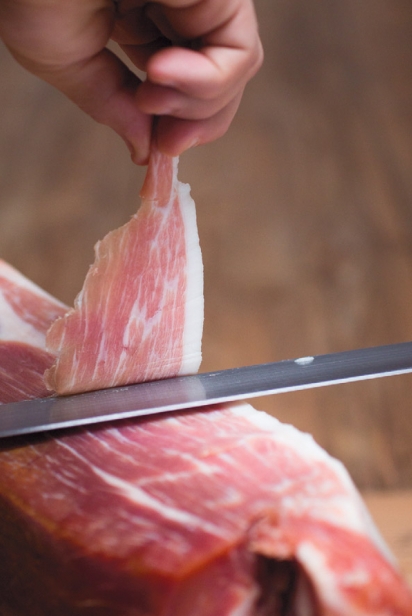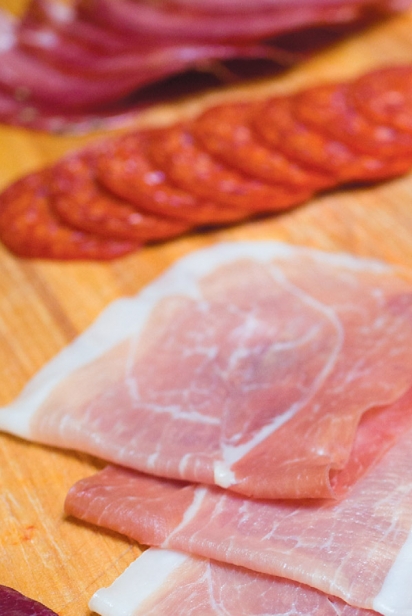History, Re-Cured
A Locally Made Prosciutto with a Feel-Good (and Tasty) Pedigree
Prosciutto is deceptive in its simplicity: Broken down into its core elements, prosciutto is not much more than salt, air, pork and patience.
But eat enough of it—which everyone should strive to do—and the paper-thin layers of mouth-coatingly unctuous, savory-sweet meat begin to reveal something more complex than its parts. Like most of the world’s great foods, every leg of prosciutto has a story to tell, one of history, and process, and origin of ingredients, all of which come through in subtle porcine nuances.
Locally, a prosciutto born from a partnership between Daniele, the Rhode Island—based, three-generation Italian specialty meats business owned by brothers Davide and Stefano Dukcevich, and nationally known sustainable meat company Niman Ranch is weaving a new narrative in the world of cured meats: It’s the story of the first humanely raised, salt-cured prosciutto commercially produced in the United States.
Sold under the Niman Ranch label, the prosciutto—deep pink, marbled and layered with complex flavor—embodies the ethos of both of its co-creators.
On the Daniele side, it’s a craft honed over decades, first by Croatian refugee grandparents in the Italian region of Trieste and now in the Ocean State, where the family’s expertly made prosciutto and salumi are dry-cured with the pure country air of Mapleville, in a state-of-the-art facility in the state’s northwestern corner.
Under this collaboration, that history and expertise come together with meat from Niman’s happy hogs, animals that, unlike their industrially raised counterparts, are free to roam, while eating a balanced vegetarian diet with no antibiotics, on more than 600 small, family-owned farms, mainly in the Midwest.
“What we do is incredibly basic, but there’s such a direct relationship between the raw product and what we do. There’s not even an oven here [at Daniele]. So we’re really dependent on the quality of the hog: how it’s raised, what it ate. You can really tell the difference when a hog has been humanely raised,” explains Davide Dukcevich.
Niman works tirelessly to ensure that farm conditions remain up to their standards, which are some of the strictest in the industry. They even dole out incentives to farms that return a certain quality of meat. All of this was started by Niman’s first hog farmer, Paul Willis. He says that effort shines through in the flavor of the animals.
“The eating quality of our hogs is as good as it gets: juicy, flavorful and tender,” Willis says. “Those attributes translate when you’re making other products as well, like prosciutto.”
Opposite the practices of raising quality hogs and making prosciutto, which both take skill-sets years in the making, the Niman-Daniele partnership came together rather effortlessly, according to Jeff Tripician, Niman Ranch general manager.
Plagued by an overabundance of product leftover from producing ham—an unacceptable predicament for the sustainably minded company—Tripician and others brainstormed what do with the excess. One employee suggested charcuterie and the idea stuck.
When Tripician reached out to a handful of small charcuterie operations that had purchased meat from their farms in the past, all of them unanimously suggested the one business that they knew could turn out a quality product in the capacity Niman was looking for: Daniele.
Approached to partner, Davide confesses some initial trepidation on his part.
“To be honest, I’ve always been suspicious of brands that tout themselves as being natural or do-gooder types, great corporate citizens, because it’s almost never totally true,” he says.
But his mindset began to shift as discussions progressed and their shared value of family became apparent.
“We look for like-minded partners in everything we do, people with that sense of family or sense of ownership that a family tends to have, be it customers, chefs or stores. It’s not a requirement of doing business with us, but we look for that,” Tripician explains.
In true family style, details were worked out over dinner, with the Dukcevich brothers insisting that Tripician meet their father before anything was a done deal. To get a deeper sense of the Niman ethos, the brothers flew out to visit a handful of the company’s partner farms in Iowa, spending a few days at each learning about their humane practices.
Davide soon became a believer.
“When you see how well these pigs are treated and how nice the farmers are and how grateful they are to Niman because they are able to raise their pigs and sell them for a premium price, while keeping the farm in family hands … I came to the conclusion that I really wish every hog on Earth could be Niman hog,” he says.
The instant connection between the two companies proved to be crucial to the partnership.
While Niman’s typical business model is what Tripician describes as “harvest and hurry” to get the freshest meat possible to market, making charcuterie proved to be a very different affair, requiring a not insignificant amount of trust in their new collaboration.
“We were sending Daniele 10,000 to 15,000 pounds of pork a week, knowing that we wouldn’t see any money coming in for at least a year,” Tripician says. “But if you have a partner you trust, you have to trust it’s the right decision.”
Working with the firmer, more fat-laden meat of the Niman hogs required flexibility on Daniele’s part as well. While it normally takes about 12 months for a hog leg to cure, they inevitably realized the Niman hogs needed about two months more for the flavors to be fully coaxed from the drying meat.
The wait, however, was not in vain.
Niman sent some of the first batch to a focus group of chefs around the country. They came back with many thumbs up and feedback like “nice marble,” “authentic” and having “a great flavor that lingers in a good way.”
It’s since made its way, along with sopressata, salami and pepperoni, to the Waterman Grille and Honest Green in Providence, Avvio in Cranston and A Market in Newport, locally, as well as specialty stores and restaurants nationwide.
The charcuterie’s success is no surprise to anyone involved in its production.
“Prosciutto is so much about the raw product. When you have the greatest-tasting pork, you’re going to have the greatest-tasting prosciutto,” Tripician says.
While the practice of using humanely raised pork to make prosciutto seems like a no-brainer, it’s far from common, even in a country like Italy, where the meat is as ubiquitous as peanut butter in the U.S.
In such a void, Davide sees a new chapter in the meat’s history just waiting to be written.
“I think the purity of the Niman story would translate well to the rest of the world. Nothing comes close to their model overseas,” he explains confidently. “Even in Italy. I think it could hold its own.”








